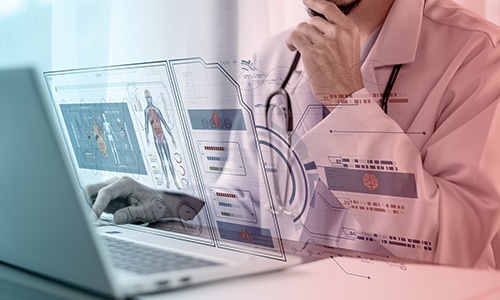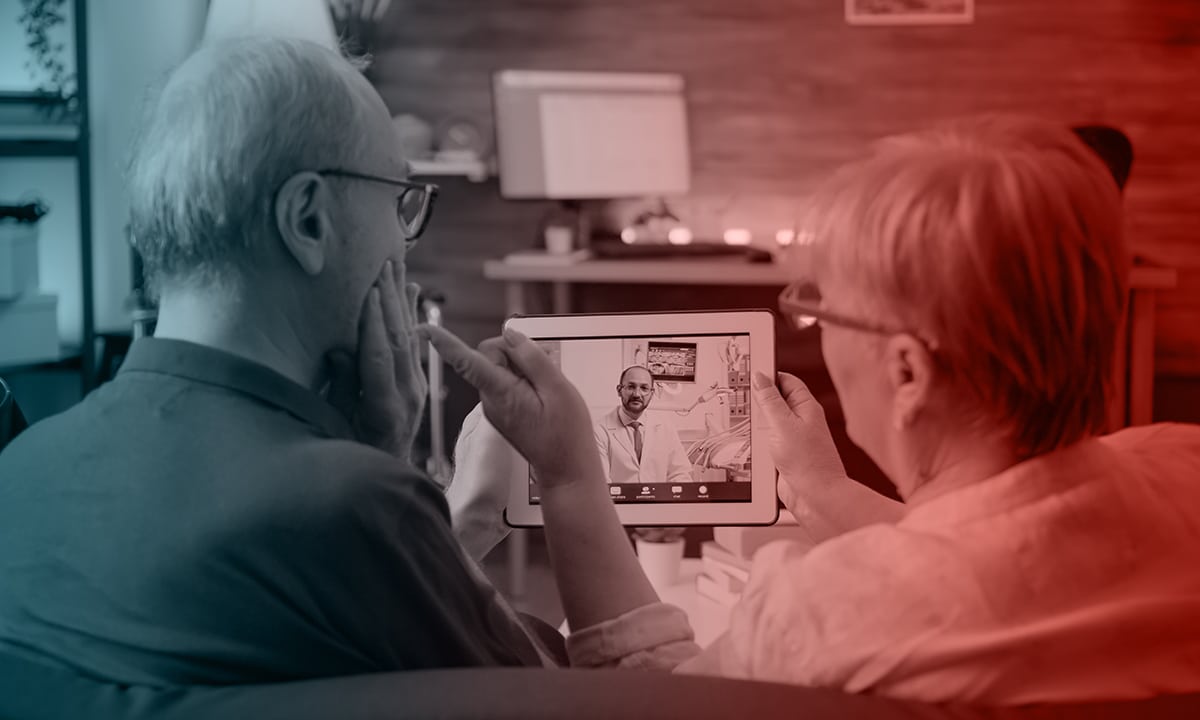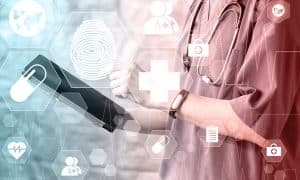Remote patient monitoring and chronic disease management are particularly challenging issues in the healthcare sector. Connected devices, wearables, patients’ stories, and clinical documentation combine to create a wide variety of data, which is the primary reason behind this challenge. This data is used to draw meaningful conclusions, identify trends, anticipate complications, and offer timely corrective measures.
Let’s uncover how Natural Language Processing (NLP) changes healthcare operations. It removes manual data processing, improves how healthcare workers interact with one another and patients, and assists in anticipatory care. We’ll also discuss how healthcare NLP is boosting telehealth and helping remote patient monitoring achieve better results.
The Role of NLP in Telehealth and Remote Patient Monitoring!
1. Data Analysis and Interpretation
 NLP enables healthcare practitioners to extract and scrutinize valuable insights from unstructured data, supporting precision care.
NLP enables healthcare practitioners to extract and scrutinize valuable insights from unstructured data, supporting precision care.
- Key Information Extraction: NLP algorithms process clinical notes, wearable data, and self-reported patient inputs to extract vital metrics such as heart rate and blood pressure readings, blood glucose levels, medication adherence trends, and patient symptoms or abnormalities.
- Trend and Pattern Analysis: Time-series data analysis with NLP identifies health trends, enabling early detection of complications like hypertension or cardiac irregularities.
- Automated Reports: NLP provides easy-to-understand, profession-specific summarization for doctors and other medical personnel, thus easing the burden of sorting through data.
Through self-sufficient data extraction and analysis, NLP can monitor and respond to patient’s needs and provide adequate treatment to healthcare providers.
2. Enhancing Communication and Patient Engagement
 NLP-powered tools streamline patient interactions and foster personalized care.
NLP-powered tools streamline patient interactions and foster personalized care.
- Understanding Patient Narratives: NLP interprets patient concerns, emotions, and preferences by analyzing self-reported data. This fosters empathy-driven, patient-centered care.
- Customized Health Education: Education intervention tools, such as booklets and pamphlets in simple and easily understandable language, tailored to each patient’s literacy level and medical condition, enable the patient to take charge of his health.
- Virtual Assistants and Chatbots: AI-powered virtual assistants provide round-the-clock healthcare support; patients can get help with their health concerns, prescription alerts, and convenience between appointments.
NLP fosters stronger patient relationships through personalized communication, tailored education, and accessible virtual support, driving better engagement and self-care.
3. Decision Support and Proactive Care
 NLP is essential in supporting healthcare providers in accurately addressing patient needs at the right time.
NLP is essential in supporting healthcare providers in accurately addressing patient needs at the right time.
- Identifying High-Risk Patients: By examining the compiled patient data in the disease registry, NLP identifies any patient who may likely develop diabetes complications or post-surgical-site infections, triggering early action.
- Real-Time Alerts: NLP alerts when specific vital health parameters are out of range so the healthcare team can act quickly.
- Medication Management: While used, NLP looks for contraindications, checks compliance, and fine-tunes dosing to reduce risks to an individual patient.
NLP equips healthcare experts with predictive insights and real-time alerts, enabling informed decisions and proactive care to minimize risks and enhance safety.
Why Does Healthcare Need NLP in Telehealth?
Healthcare NLP makes managing chronic diseases and remote patient monitoring seamless. It leverages data-driven insights to transform care delivery.
- Improved Patient Outcomes: NLP improves patients’ treatment and results by collecting and analyzing data to diagnose and manage patients’ progress.
- Operational Efficiency: Through data analysis, NLP can reduce and minimize the time healthcare professionals spend manually wading through vast piles of data.
- Cost Savings: Effective resource management and minimal paper use improve healthcare costs.
- Patient Engagement: Specific messages and self-managerial digital resources enhance patients’ adherence to the prescribed treatment.
Healthcare NLP incorporated into telemedicine solutions will allow providers to work more effectively and benefit patients with personalized and effective healthcare in the future.
Real-World Use Cases of NLP in Telehealth
NLP has already demonstrated its potential to transform telehealth through innovative applications:
AI-Powered Chatbots
In healthcare, virtual assistants like ChatGPT analyze patient queries, provide accurate health advice, and schedule appointments, improving accessibility and engagement.
Predictive Analytics
NLP algorithms process clinical notes and wearable data to identify early warning signs for diabetes or hypertension, enabling proactive interventions.
Personalized Patient Support
NLP tailors health education materials to individual literacy levels and preferences, promoting better self-care.
These examples highlight how NLP bridges gaps in care, enhances patient outcomes, and streamlines healthcare workflows.
Future Outlook: NLP’s Role in Shaping Telehealth
The future of telehealth is closely tied to advancements in Healthcare NLP. Here’s what lies ahead:
Predictive Analytics
Improved medical algorithms used in diagnosis will reduce people's vulnerability by offering preventive measures.
Scalable Virtual Assistants
More chatbots and AI tools will soon be standard, making health care accessible to patients.
Global Integration
NLP will enable consistent, efficient care across diverse healthcare systems, ensuring equity and scalability.
NLP will reshape telehealth with predictive care, virtual support, and global integration for more innovative, accessible healthcare.
NLP – The Key to Smarter Healthcare!
Healthcare NLP is set to transform telehealth and remove barriers in chronic disease management and healthcare big data processing. Its capability of identifying patterns, tailoring the message, and facilitating early intervention makes it indispensable to contemporary healthcare development.
As NLP technology continues to improve, it will be integrated into more roles in the healthcare industry. Here, it can be used to provide predictive analytics and real-time decision-making abilities and fully assimilate into the current and future landscape of healthcare systems around the globe. By driving operational effectiveness and supplying value-based consumer service, NLP is future-proofing telehealth and creating a fairer, more innovative healthcare environment globally.




